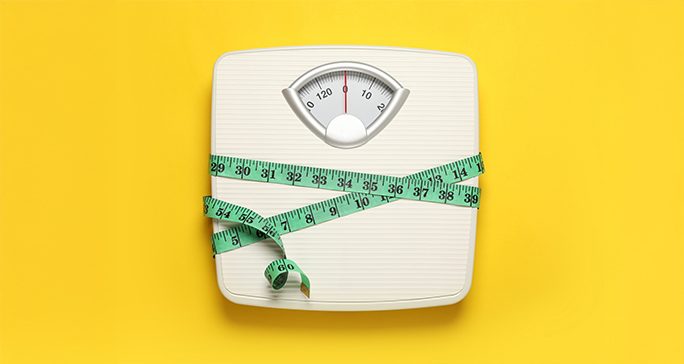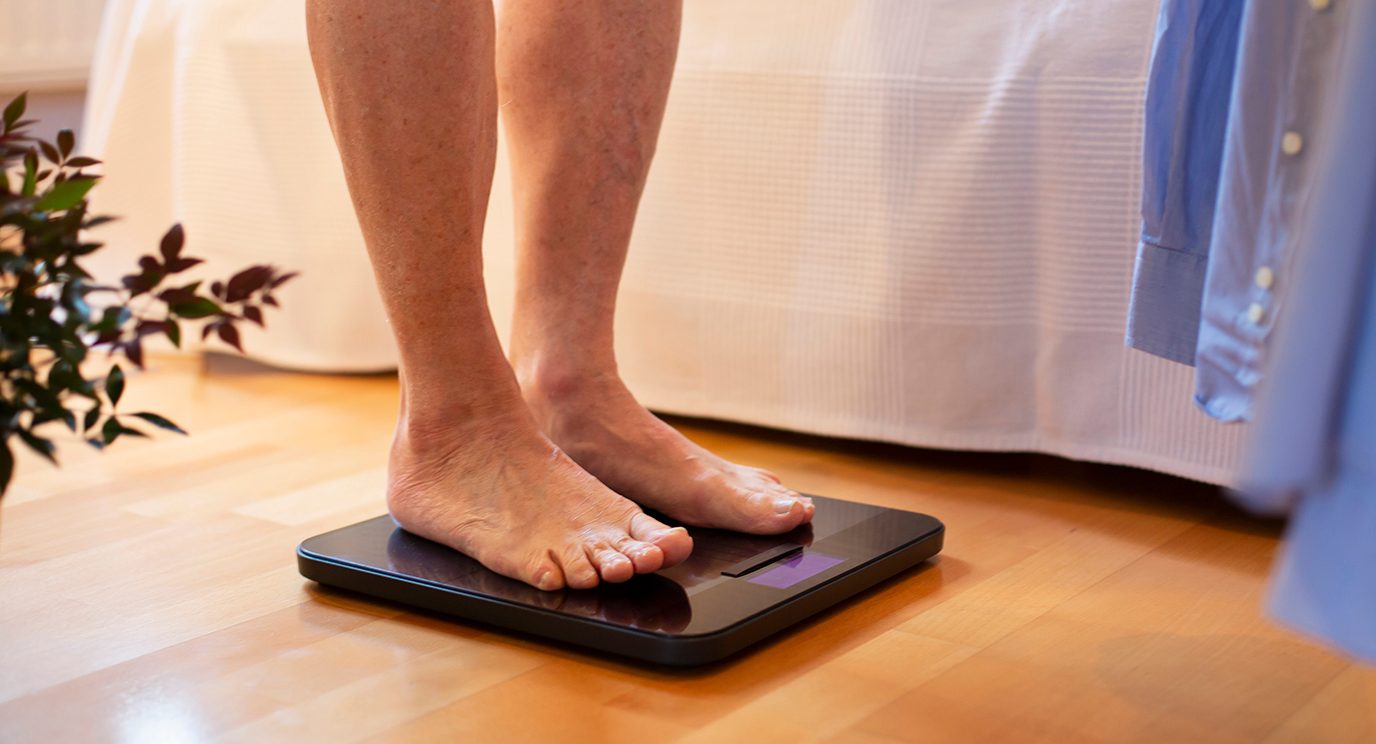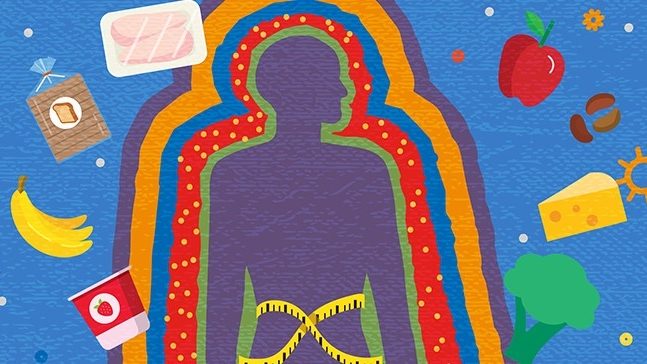How portion control can help you
Body Weight
Maintaining a healthy weight will reduce your risk for many types of cancer, including breast, colon, uterine and liver cancers.
Maintaining a healthy weight will reduce your risk for many types of cancer, including breast, colon, uterine and liver cancers.
Only 25% of adults in the United States are a healthy body weight. And the link between body weight and cancer is clear. Research shows that if you fall into the overweight or obese categories, you are at higher risk for more than 10 cancers.
Researchers aren't exactly sure why high body weight increases the risk of cancer. It's likely because excess weight causes hormonal changes and inflammation that make cells multiply more rapidly than normal. The more cells multiply, the more likely it is that there will be a mistake that results in uncontrolled growth and cancer. Three factors that cause cells to multiply more quickly are:
- Inflammation. Excess weight causes a build-up of visceral fat, which is the fat that surrounds your organs. That low oxygen environment in visceral fat triggers inflammation, which causes cells to multiply.
- Insulin resistance. Inflammation can also stop your body from responding to insulin, the hormone that regulates blood sugar. If you become insulin resistant, your body will produce more insulin and that can cause cells to multiply more quickly.
- Increased estrogen. Fat cells in men and women make estrogen, and estrogen also causes cells to multiply more quickly.
Are you a healthy weight?
One way to find out if you are a healthy weight is to determine your body mass index. You can calculate your BMI using a BMI calculator. Your results will put you in one of four categories: underweight, normal, overweight or obese.
BMI Calculator
Body Mass Index (BMI) is a tool to help you determine if you are a healthy weight. Fill out the fields below to get your BMI.
| BMI | Classification |
|---|---|
| Less than 18.5 | Underweight |
| 18.5 - 24.9 | Healthy |
| 25 - 29.9 | Overweight |
| 30 or higher | Obese |
Your BMI indicates that you are underweight. Talk to your doctor about ways to maintain a healthy weight. No matter what your weight is, eating a plant-based diet and staying physically active can reduce your risk for cancer.
Your BMI is in the normal range. If you have questions or concerns about your BMI or maintaining a healthy weight, talk to your doctor. No matter what your weight is, eating a plant-based diet and staying physically active can reduce your risk for cancer.
Your BMI is in the overweight range. Maintaining a healthy weight is one of the most important things you can do to reduce your risk of cancer and other chronic diseases. You can take steps to maintain a healthy weight.
Your BMI is in the obese range. Maintaining a healthy weight is one of the most important things you can do to reduce your risk of cancer and other chronic diseases. You can take steps to maintain a healthy weight.
BMI is not the only way to see if you are carrying too much body fat. You can also measure your waist circumference. The amount of extra weight around your belly correlates to the amount of visceral fat you have around your organs.
Whichever you choose, be sure to talk with your doctor. They can take into account other factors that may affect your health.
How to maintain a healthy weight
Losing weight is not easy. However, if you can maintain a healthy weight, you will improve your quality of life and reduce your risk for diseases like cancer.
Here are three important strategies:
Cut out empty calories
Empty calories are calories in foods that don't have any nutritional value. Usually your body has no choice but to store these calories as fat. For example, foods like cookies and cake contain an excess of fat and sugar, without any of the vitamins, minerals or fiber that your body needs.
Empty calories can also be found in foods that seem healthy, like whole wheat bread and yogurt. It's important to check nutrition labels and if you see added sugar, choose an alternative. To avoid empty calories, stick to whole foods including vegetables, fruits, whole grains and lean proteins. These foods will give you the fat and natural sugar you need, without the extra calories that your body will store as weight gain.
Control portions
It's easier to maintain a healthy weight if you eat the right portion sizes. This can be hard to do because portions in restaurants and in packaged foods can have multiple servings. Learn the recommended serving size for common foods so you don't overeat. You can use a chart or even your hand to get the right serving size. Try not to confuse servings with portions. A portion is the number of servings you give yourself.
Stay physically active
Eating fewer calories is most effective when it comes to weight loss, but physical activity can help prevent you from gaining the weight back. Aim for at least 150 minutes of moderate exercise or 75 minutes of vigorous exercise each week. You can split this up throughout the week, and do it in increments as short as 10 minutes.
Every minute counts. Make sure you are reaching moderate or vigorous levels by paying attention to your breath. If you can talk but not sing, you are doing moderate exercise. If you can say a few words but not hold a conversation, you are doing vigorous exercise. You should also do weight training exercises twice a week to build and maintain lean muscle mass.


Featured Podcast:
GLP-1 drugs and cancer treatment: Research and risks
How does obesity cause cancer?
7 tips for maintaining weight loss
You’ve hit your weight loss goal! Now what?
While there is no shortage of information on how to lose weight, it can be trickier to determine how to keep weight off for good.
Fortunately, many of the healthy habits that can be used to lose weight are the same ones that will support you in maintaining weight loss.
Ahead, senior clinical dietitian Jessica Tilton shares tips for making your weight loss stick long term.
Re-evaluate your body’s needs
First, let’s talk about why it is common to regain weight after weight loss. Tilton says this is because when you have less body mass, your body needs less energy – that is, fewer calories.
“As weight loss progresses, energy needs decrease. When you reach your goal weight, you have to maintain that lower energy rate, and most people have difficulty doing that,” she says.
She recommends using a body weight planner to help determine how many calories to eat per day based on your weight, height, sex, age and activity level.
Monitor calories or portion sizes
Weight loss requires a caloric deficit, which means consuming fewer calories than your body uses. After losing weight, you no longer need to remain in a caloric deficit. However, going back to the same eating patterns you had before weight loss could result in weight gain.
“To continue maintaining your weight, you’re going to have to be sure that you hold to some caloric goal. The main thing is you have to do regular tracking of diet, physical activity and your weight,” Tilton says.
But if tracking calories isn’t the best approach for you, don’t sweat it! Keeping an eye on portion size, choosing healthy options and following the other tips on this list can also aid in maintaining weight loss.
Eat regularly
If you’ve ever been so hungry before a meal that you couldn't help but overindulge when you finally had the chance to eat, you’ll understand why Tilton suggests eating regularly to maintain weight loss.
“If you eat a lot at one time, you can have a glucose spike and then have a crash. But if you eat three meals, you tend to control the calories because you won’t be ravenously hungry. You can plan and control those meals and you'll tend to have more even glucose levels,” she says.
Choose healthy foods and drinks
Now that we’ve covered when to eat, let’s talk about what to eat.
MD Anderson dietitians recommend eating healthy foods. Come mealtime, this means filling two thirds of your plate with whole grains, vegetables, fruits, beans, nuts and seeds, and limiting lean animal protein or plant-based protein to the remaining one-third.
Tilton also recommends eating more non-starchy vegetables and plant-based proteins and choosing fewer calorically dense options, such as deep-fried foods, processed foods and fast food.
What you drink can also have an impact on weight. Remember to account for the calories in options like soda, sports drinks, energy drinks, sweetened coffees and teas, and alcoholic beverages.
For cancer prevention, it is best not to drink alcohol. For those that choose to drink, MD Anderson recommends men limit themselves to two drinks a day, while women limit themselves to one drink a day.
Prioritize physical activity
While Tilton says diet is the most important factor in weight loss, movement plays an important role in overall health.
Physical activity can benefit cardiovascular health, support digestion and strengthen muscles. It also supports a healthy body weight, which can lower the risk for some cancers.
The American Institute for Cancer Research recommends 150 minutes of exercise each week. This might look like dedicating 30 minutes each weekday to your favorite types of movement, whether that be lifting weights, swimming, practicing yoga, jogging, dancing, strength training, walking, group fitness classes, or playing sports. Find what works for you!
If you don’t already exercise, start gradually.
This might look like increasing your physical activity over several weeks. For example, the first week, add 15 minutes of physical activity, like walking or biking, into your routine 3 times. The next week, do 20 minutes of physical activity 3 times. The third week, aim for 25 minutes of exercise 4 times, and by the fourth week, 30 minutes of exercise 5 times.
Another way to add more movement to your day is to set a goal to stand up and move for a minute or two each hour you are awake.
Learn more about creating a workout plan.
Get enough sleep
While diet and exercise might get more attention for their roles in weight loss, sleep also contributes.
Tilton says studies have shown a link between getting enough sleep and maintaining weight loss. Additionally, she says sleep supports the brain-gut connection, and that too little sleep can increase inflammation.
“There's a very strong brain-gut connection, so you need to give the body and the brain rest, which is why it’s important to get sleep,” she says.
Adults should aim to sleep between seven and eight hours per night.
Monitor your progress
Tilton’s most important piece of advice for anyone looking to maintain weight loss is to monitor progress.
This might look like scheduling daily or weekly weigh-ins, measuring yourself, taking progress photos, or noting how your favorite pair of pants fit.
However this looks for you, Tilton says self-monitoring can provide insight into the lifestyle factors that may be influencing your weight. This could be as simple as noting that you indulged more than expected over the weekend or haven’t been finding time to exercise.
Tilton also acknowledges that losing weight is a process, and a difficult one, at that.
"Weight loss is hard to maintain. It’s never linear. But I always remind people that even 5 to 10% weight loss has been shown to have positive effect,” she says.
If you are struggling to maintain weight loss, Tilton suggests checking in with a registered dietitian or weight loss specialist. This can be especially helpful if the initial changes you made to lose weight weren’t ones you can see yourself sticking to long-term.
"The changes to lose weight take time,” Tilton says. “They’re the ones that clients can live with for a lifetime. It’s something that's not, ‘I can do this for six months, and then I won't have to.’”
Request an appointment at MD Anderson online or call 1-877-632-6789.
How to lose weight without exercise
You may be familiar with sayings such as ‘You can’t exercise your way out of a bad diet’ or ‘Abs are made in the kitchen.’ But are those sayings true? How much does diet really impact body weight? And is it possible to lose weight without exercising?
We called on clinical dietitian Jessica Tilton to learn more about the factors that impact weight loss and how to lose weight without changing your activity level.
Learn if you need to lose weight
Tilton says Body Mass Index (BMI) is used to calculate whether an adult is at a healthy weight or has a high body weight.
Those with a BMI of 25 or higher are considered overweight. You can use a BMI calculator to find out where you land.
Tilton says excess body fat is causally linked to many health concerns. These include pulmonary disease, nonalcoholic fatty liver disease, gallbladder disease, hypertension, coronary heart disease, severe pancreatitis, certain cancers such as breast cancer and colorectal cancer, skin issues and gout.
Understand what factors impact weight loss
Losing weight is a challenging feat with instructions that can feel frustratingly simple.
“Weight loss requires consuming fewer calories than the body needs,” Tilton says.
Consuming fewer calories than the body burns, or a caloric deficit, leads to weight loss. Consuming more calories than the body burns leads to weight gain.
“Generally, people cannot exercise their way into weight loss,” she says.
This doesn’t mean you should avoid exercise. Instead, think of diet and exercise as a team that packs double the punch in supporting a healthy body.
Tilton says exercise has both physical and mental benefits that include improving brain health, strengthening bones and muscles, reducing the risk of disease, improving mood and helping with weight management.
“You really do want to do both because being sedentary is obviously not as healthy as being active," she says.
Determine how many calories your body needs
To determine if you are in a caloric deficit, you first need to know how many calories your body uses each day.
This can be done in a number of ways, but two options that Tilton suggests are the Total Daily Energy Expenditure and Resting Energy Expenditure formulas.
Total Daily Energy Expenditure and Resting Energy Expenditure calculators can be found online. They use factors such as gender, height and weight to provide daily calorie recommendations.
- Resting Energy Expenditure estimates how many calories your body burns at rest.
- Total Daily Energy Expenditure estimates how many calories your body burns depending on your typical activity level.
While nutritional needs look different for each person, Tilton says consuming 300 to 500 calories under your estimated total daily energy expenditure can help with weight loss.
It is important to lose weight in a way that is realistic and sustainable. Tilton says eating too few calories each day can lead to fatigue, muscle aches and possible essential vitamin and mineral deficiencies. If you need support and guidance in choosing a safe and effective weight loss plan, talk to your doctor or a licensed dietitian.
Additionally, cancer patients should discuss weight loss goals with their care team to avoid nutrient deficiencies and address how treatment may impact their efforts.
Monitor your calories and portions
“Diet is the most important factor in weight loss,” Tilton says.
To better understand your diet, she recommends keeping track of how many calories you are eating. There are a variety of fitness apps that can be helpful in tracking calories, or you can do it with a good old-fashioned paper and pen.
If you’d prefer not to track calories, it can be helpful to consider your portion sizes. If you notice you are eating more than your body needs to feel satiated, work toward smaller servings.
“When you’re monitoring portions, you’re decreasing calories,” Tilton says.
Fill up on healthy options
Choosing healthy, whole foods can aid in weight loss efforts by keeping you full and fueled.
MD Anderson dietitians recommend a diet primarily made up of healthy, nutritious foods. Aim for two-thirds of your diet to be made up of vegetables, whole grains, beans, fruits, nuts and seeds; the remaining third can be lean protein and dairy products.
Tilton says vegetables can make healthy snacks, and drinking more water helps the body feel full.
Of course, what you don’t eat can be just as important as what you do.
For those trying to lose weight, Tilton recommends cutting back on liquid calories, such as sugary beverages, beer and wine. She also suggests choosing fewer refined carbohydrates, fatty fried options and sweets.
While adjusting your diet and losing weight can be challenging, Tilton says that for those with a high body weight, losing even 5% to 10% of initial body weight can make a big difference in reducing some health risks.
“When people start losing weight, it’s naturally reinforcing. They start feeling better,” says Tilton. “They know ‘I can do this.’”
Request an appointment at MD Anderson online or by call 1-877-632-6789.
Processed meat and cancer: What you need to know
Processed meats are convenient, affordable and woven into our collective diet. For many, bacon is a breakfast favorite, deli meat is a lunchbox staple and no cookout would be complete without hot dogs and hamburgers on the grill.
Unfortunately, cancer-causing substances form when these meats are preserved.
“Many of the preservation methods used for processed meats have been shown to contribute to the development of cancer,” says wellness dietitian Lindsey Wohlford.
There is no way to completely eliminate your risk of cancer. However, the American Institute of Cancer Research recommends eating “little, if any, processed meat.” They are considered carcinogens, so eating them increases your cancer risk.
Ahead, Wohlford explains more about the link between processed meat and cancer risk and shares tips for eating less processed meat.
Help #EndCancer
Give Now
Donate Blood
Our patients depend on blood and platelet donations.
Shop MD Anderson
Show your support for our mission through branded merchandise.









